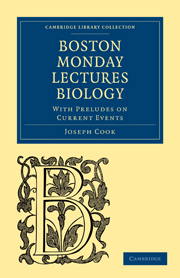Book contents
- Frontmatter
- INTRODUCTION
- Contents
- LECTURES
- I HUXLEY AND TYNDALL ON EVOLUTION
- II THE CONCESSIONS OF EVOLUTIONISTS
- III THE CONCESSIONS OF EVOLUTIONISTS
- IV THE MICROSCOPE AND MATERIALISM
- V LOTZE, BEALE, AND HUXLEY ON LIVING TISSUES
- VI LIFE, OR MECHANISM—WHICH?
- VII DOES DEATH END ALL? INVOLUTION AND EVOLUTION
- VIII DOES DEATH END ALL? THE NERVES AND THE SOUL
- IX DOES DEATH END ALL? INSTINCT IMMORTAL?
- X DOES DEATH END ALL? BAIN'S MATERIALISM
- XI AUTOMATIC AND INFLUENTIAL NERVES
- XII EMERSON'S VIEWS ON IMMORTALITY
- XIII ULRICI ON THE SPIRITUAL BODY
- INDEX
II - THE CONCESSIONS OF EVOLUTIONISTS
Published online by Cambridge University Press: 05 October 2010
- Frontmatter
- INTRODUCTION
- Contents
- LECTURES
- I HUXLEY AND TYNDALL ON EVOLUTION
- II THE CONCESSIONS OF EVOLUTIONISTS
- III THE CONCESSIONS OF EVOLUTIONISTS
- IV THE MICROSCOPE AND MATERIALISM
- V LOTZE, BEALE, AND HUXLEY ON LIVING TISSUES
- VI LIFE, OR MECHANISM—WHICH?
- VII DOES DEATH END ALL? INVOLUTION AND EVOLUTION
- VIII DOES DEATH END ALL? THE NERVES AND THE SOUL
- IX DOES DEATH END ALL? INSTINCT IMMORTAL?
- X DOES DEATH END ALL? BAIN'S MATERIALISM
- XI AUTOMATIC AND INFLUENTIAL NERVES
- XII EMERSON'S VIEWS ON IMMORTALITY
- XIII ULRICI ON THE SPIRITUAL BODY
- INDEX
Summary
“If everything is governed by law, and if all the power is in the physical universe that ever was there, where is God? In the intention.”
—Professor Benjamin Pierce, Unitarian Review, June 1877, p. 665.“In regard to the physical universe, it might be better to substitute for the phrase ‘government by laws’ ‘government according to laws,’ meaning there by the direct exertion of the Divine Will, or operation of the First Cause in the Forces of Nature, according to certain constant uniformities which are simply unchangeable, because, having been originally the expression of Infinite Wisdom, any change would be for the worse.”
—Dr. W. B. Carpenter, Mental Physiology, chap. xx.Aristotle said of Socrates that he invented the arts of definition and induction. But Socrates, we know, was not a teacher of logic; he was the investigator of ethical truth; and it was in the endeavour to satisfy a distinctively theological thirst that he smote the rocks at the foot of the Acropolis, and caused to gush forth there these crystalline headsprings of the scientific method. Unless we think boldly, north, south, east, and west, and syllogistically, and on our knees, we do not think at all. A Greek teacher of morals first taught us to think in this manner, and, as instruments of ethical research, invented definition and induction. The scientific method thus had a theological origin.
- Type
- Chapter
- Information
- BiologyWith Preludes on Current Events, pp. 18 - 24Publisher: Cambridge University PressPrint publication year: 2009First published in: 1879



